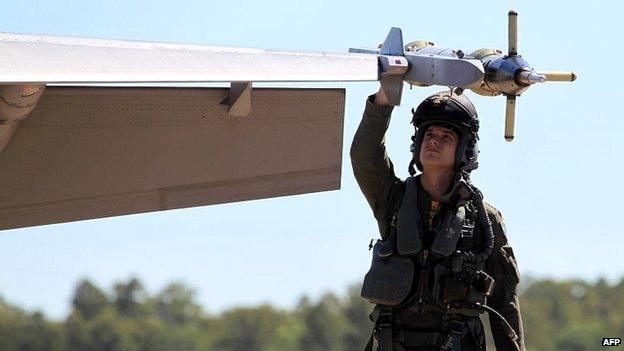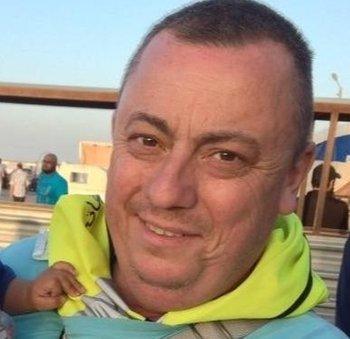Arab states 'offer help with air strikes' against Islamic State
- Published
John Kerry has said that several Arab countries will take part in air strikes against Islamic State, Tom Esslemont reports
Several Arab countries have offered to take part in air strikes against Islamic State (IS) militants in Iraq, US officials say.
But any action is subject to approval from the Iraqi government, they add.
US Secretary of State John Kerry says he is "extremely encouraged" by promises of military assistance to tackle the extremist group.
He spoke in Paris after a whirlwind tour of the Middle East trying to drum up support for action against IS.
France is due to host an international conference on Monday about Iraqi security and tackling IS.
On Saturday, the militant group released a video showing the beheading of UK hostage and aid worker David Haines. The group has threatened to kill a second Briton, Alan Henning, who also appeared in the video.

Action against Islamic State militants should include Syria, says the country's Deputy Foreign Minister Faisal Mekdad
Analysis: Jeremy Bowen, Middle East editor, Damascus
"You cannot fight terrorism when you collaborate with those who created these terror groups including in Saudi Arabia, Qatar, Turkey and others," Syrian Deputy Foreign Minister Faisal Mekdad told me.
Those countries deny they've ever backed Islamic State. But Qatar and Saudi Arabia have provided weapons to Sunni rebel groups, some of whose members have moved to Islamic State.
Turkey has let Sunni fighters, including jihadists from al-Qaeda and IS across its border into Syria.
Mr Mekdad said that as well as Syria an effective coalition would also have to include Russia and Iran: the Assad regime's key allies.
He repeated Syria's view that any air strikes on its territory without its permission would be an act of war, a violation of the UN charter and a disaster not just for Syria but for the region.

'Flawed plan'
Earlier, Australia announced it was sending 600 troops to the region ahead of possible combat operations against IS militants in Iraq.
However, Mr Kerry said in remarks to CBS on Sunday that the US was not seeking troops on the ground at the moment.
Islamic State is now in control of large parts of Iraq and Syria and the CIA estimates that the group could have as many as 30,000 fighters in the region.

Australia has promised to send a 600-strong force, including up to eight Super Hornet fighter jets
Last week, US President Barack Obama presented a strategy to fight the group in both Iraq and Syria.
So far, nearly 40 countries, including 10 Arab states, have signed up to a US-led plan to tackle the extremist group.
In a BBC interview, Syria's Deputy Foreign Minister, Faisal Mekdad, said President Obama's plan to build a coalition against Islamic State without Syria was flawed.
"His strategy lacks a lot of very important elements. Syria fought against terrorism and we shall be in the centre of any real and serious battle against terrorists."
Ground troops
The US has already targeted IS in Iraq with air strikes in recent weeks and President Obama has vowed to "hunt down" the group after it beheaded two American journalists.
"We have countries in this region, countries outside of this region, in addition to the United States, all of whom are prepared to engage in military assistance, in actual strikes if that is what it requires," US Secretary of State John Kerry told CBS's Face the Nation programme on Sunday.

IS has now threatened to kill another hostage, Alan Henning
He acknowledged that some countries were willing to put troops on the ground, without identifying them, but said that this was not an option "at this moment anyway".
White House chief of staff Denis McDonough said Mr Kerry would reveal "over the coming days" which countries had offered ground assistance.
"Ultimately to destroy ISIL we do need to have a force, an anvil against which they will be pushed - ideally Sunni forces," he told NBC on Sunday.
Securing agreement to use regional bases and air space for military operations was key and this seems to have been forthcoming from Gulf states, says the BBC's Barbara Plett-Usher in Paris.
US officials continually stress that the strategy is much broader than a military campaign and say intervention by religious leaders in Egypt and Saudi Arabia to counter the extremist ideology of IS is as important as dropping bombs on targets, our correspondent adds.

Analysis by Tom Esslemont, BBC News, Washington
John Kerry has said he's got "all bases covered" in the United States' coalition of partners.
He and President Obama have made clear the goal is to empower the moderate Syrian opposition to take up the fight against Islamic State - if there are to be any boots on the ground than they won't be American.
This view is met with scepticism by those who believe US troops need to be more, not less, involved. One Republican senator, Lindsey Graham, said it was fantasy to "outsource" what was essentially a war America's army needed to fight.
On the whole, the White House appears to have the required backing for his plan of training and equipping Syrian opposition fighters - a move on which Congress is expected to vote.
The speaker of the Republican-controlled House of Representatives, John Boehner, has urged his party to give the president the extra authority he is asking for.

On Monday, French President Francois Hollande will welcome diplomats from up to 20 countries for a conference on Iraqi security.
The talks come ahead of a UN Security Council meeting next week and a heads of state meeting at the UN General Assembly later this month.
